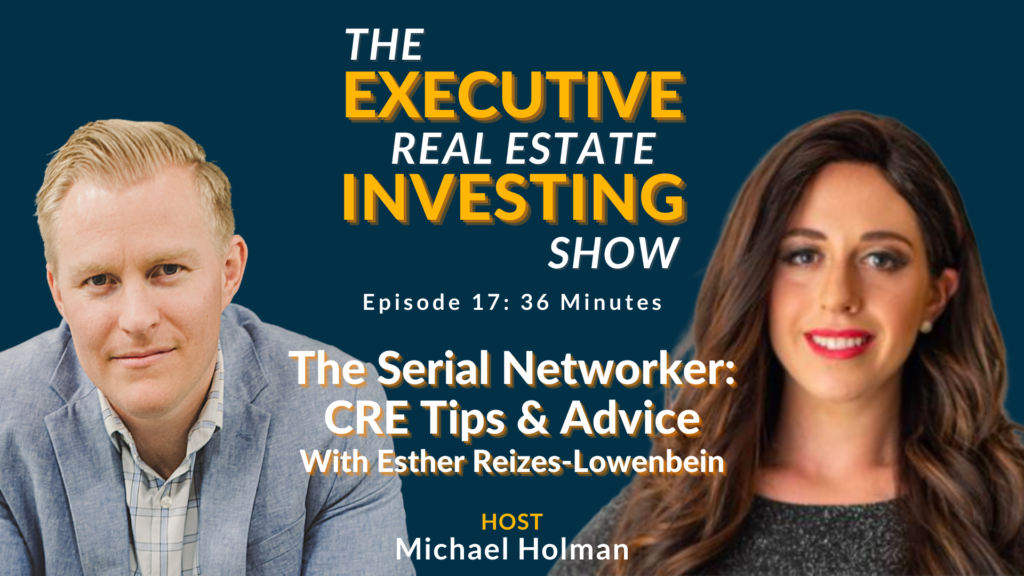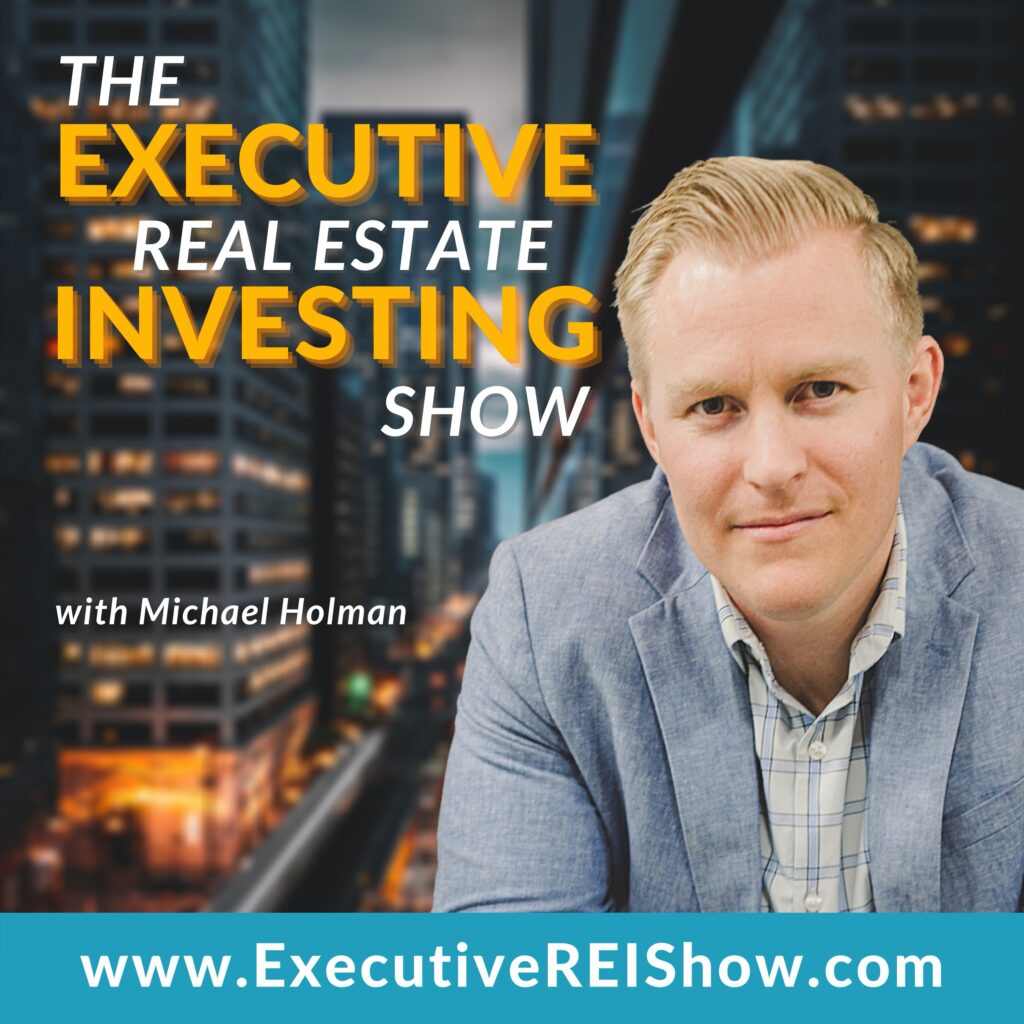
The executive Real estate investing Show
EPISODE 17
The Serial Networker: CRE Tips & Advice with Esther Reizes-Lowenbein
- September 27, 2021
EPISODE SUMMARY
This week on the show, host, Michael Holman talks with Esther Reizes-Lowenbein, who services the commercial real estate market as an investment/fund manager, investor and realtor.
Esther has redefined the face of real estate by offering professional and on-demand service. She has successfully closed over 300 million dollars in commercial transactions thus far. She is recognized as a “serial net-worker” and has a knack at connecting buyers, sellers and investors.
Esther holds a master’s degree from Adelphi University. She is an entrepreneur and philanthropist. She takes great pride in her wonderful children. Additionally, Esther, together with her husband are extremely active in their community and run a non-for profit, providing relief for underprivileged individuals.
Listen now to learn from Esther Reizes-Lowenbein on how real estate has changed her life.
EXECUTIVE TIP
Learn How to Connect With Other People
LISTEN TO THE PODCAST HERE

The Executive Real Estate Investing Show Podcast
EP 17: The Serial Networker: CRE Tips & Advice with Esther Reizes-Lowenbein
Listen on
READ THE TRANSCRIPT HERE
Note: Audio transcription has been automatically transcribed
Welcome to The Executive Real Estate Investing Show. This podcast is for you, the busy business owner or executive looking to create generational wealth. Here, we’re going to show you how to do that through real estate investing from multifamily to industrial and everything in between. You will become a real estate investing expert. And now, here’s your host, Michael Holman.
Michael Holman: Hello everyone, and welcome to another episode of The Executive Real Estate Investing Show. I’m your host, Michael Homan, and really excited to have you with us again. This week, especially we have a special guest. Her name is Esther Reizes-Lowenbein. She is amazing.
She is a real estate broker, she’s an investor, she’s a mother of eight. She’s got a crazy life. And she’s here to share with you all of her little tips and tricks and secrets and information. On what you need to do and little things that can help you in your business and in your real estate investing life.
So this is an amazing episode and really excited to have her on today. As always though we are going to start off today’s episode with an executive tip and today’s executive. Is learn how to connect with other people. And specifically, what I am saying by that is learning to connect with other people that you don’t already know, right.
This can be done through social media. This can be done through meetups or different events or groups but is really important. I mean, most people don’t have an end off beyond that. As it stands right now, right? A lot of times you need to learn how to expand your network and expand your growth. And one of the important things that you have to do and understand is there how to expand that network.
Well, how do you expand that network? You connect with others that you don’t already know, and you have to connect. You know, it starts off small, but you have to learn how to start connecting in meaningful ways. And this, like I said, this can be done through all sorts of mediums. One of, one of my personal favorites, I love LinkedIn and some other social media platforms.
And that’s really where I’ve been connecting with a lot of people that I don’t know. In fact, this episode, LinkedIn is how I connect first, started connecting with Esther. So, we’re going to get right into. But that is today’s executive tip. Hello everyone, and welcome to another episode of the executive real estate investing show.
Thank you for joining us. This is going to be an amazing episode. Everyone. We have a fantastic guest. In the real estate world, as one of the best networkers there is, I actually first started seeing her from some of the posts that she was doing on LinkedIn and they were, they were amazing, right.
We were just talking, she’s had, you know, up to 50, 200,000 views on those posts and just really excited to introduce everyone to Esther Reizes-Lowenbein. Welcome to the show.
Esther Reizes-Lowenbein: Thanks for having me on. And you got my name.
Michael Holman: You know, I appreciate that. I must admit, I had to ask how, how to say it exactly, but I appreciate you helping me with that and I’m never gonna forget it now.
No one else on this show is, is well. To give a quick introduction to Esther. Esther is really redefining the face of real estate. I mean, she has, she’s an investor, she’s a real estate agent, she’s a syndicator. She’s doing all sorts of things. General partner, she’s starting a PRI fund. I believe correct me if I’m wrong as, but a private equity fund for real estate.
She’s doing a lot of amazing things. So., I want to hear more about this? What, what is it that you’re focusing on right now?
Esther Reizes-Lowenbein: Thanks for the intro, I appreciate that. Right now, I am still brokering as a razor that I’m really excited about raising equity, helping people, you know, raise through JV structures or code GP structures or LP structures.
I am now starting a private equity fund for commercial real estate to raise money from LPs, and I am super pumped.
Michael Holman: That is, that is awesome. And that’s really not a small feat. I mean, to be able, that means you have to have a lot of relationships. And I think that kind of goes to what you’re talking about.
Being this networker. You have to have a lot of relationships. Tell us, tell us a little bit about that, about that fund. What is what is the target asset class? How big is you planning on being?
Esther Reizes-Lowenbein: I don’t have a target asset class as a, now it’s commercial real estate. It can be any opportunity in any location or any asset.
So long as I liked the sponsors and the deal, I hired an underwriter. That’s going to be underwriting the deal. I invest in every single deal that I raise for. So, I really have to like the deal in order to raise for it. So it can be, I’m going to be doing a Delaware series all season. I’m going to be able to have several SPVs within one.
So I can have several opportunities for investors to see and choose which deal they’d like to invest in. Everything is going to be very.
Michael Holman: That is awesome. I, you know, I actually am, am really interested in some of this, and I know some of our, some of our listeners you know, they’re used to very simple, regular syndication funds and enter you’re here talking about you know, a little bit of a different model than, than probably what most people are familiar with.
Can you, so you go into the structure a little bit of that fun. I’m really interested, and I know our listeners will be interested as well.
Esther Reizes-Lowenbein: I spoke to about 14 attorneys before I decided to go with the one that I’m working with right now. And I was learning everything about funds. Once I decided to go into it, I just picked up every single book about it.
Every podcast I’m listening to you, and there’s so many different structures to have fun. Like you can do a blind and fund an open-ended fund. Many different ways you can do it. You could have a member’s managed LLC, a manager managed LLC. I just felt like that one is most fitting for me. I like when things are fully transparent, I like when investors can see where they’re putting their money into.
And I couldn’t decide on which assets to go with because there’s so many cool opportunities and various assets. So that just led me to the fund. And it was my attorney’s idea actually. So yeah, I’m excited and happy that he presented the offer.
Michael Holman: that is fantastic.
So I, I really liked, that you’re doing that. And you’re, you know, it’s amazing. We’re talking about the networking, right? I mean, when most people start a fund, they don’t have the network or the relationships to come in and say, hey, I’m going to do anything that relates to commercial real estate.
Most people would love to do. But oftentimes most sponsors feel like they have to be very specific, right? I am doing apartments a hundred to 300 units in these two markets. And this is the deal size that I’m doing. And you get very specific, and I think that goes back to the networking and the relationships that you have to be able to work on a fund like that.
Oh, you know, what, what do you feel are some of the things that you do or the characteristics that you have that make you such a good networker?
Esther Reizes-Lowenbein: Well, just one point, I’m going to be a reason for other people. So, I don’t have to, it’s not me focusing on one thing. It’s, I’m raising for other people, so I can focus on many things while those sponsors focused on their thing.
Yeah, well, it makes me a good networker. It’s a good question. I don’t even know because for me it’s natural. I love communicating with people, I love reaching out to people. I think I went into the field. One of the reasons I’m being is that I like connecting with people, I guess, on a massive extrovert.
So for me, it’s just natural. I don’t have any major tips. I, I really enjoy it. So that’s all I.
Michael Holman: Yeah, no, I mean, that’s fantastic. And you can tell, right. Even just being on this interview, that you’re definitely an extrovert and I love it. Right. People are definitely drawn to drawn to your personality.
So was it always your dream to be a real estate broker sponsor investor? You know, was that, was that the goal from the very beginning?
Esther Reizes-Lowenbein: No, actually, no. I’m the speech language pathologist. I have my master’s degree in speech therapy. I’ve been working in that field for, I don’t know, as a 10 years or so until about three and a half years ago.
Several factors in my life made me switched careers. We moved from Brooklyn, New York to Rockland county and the speech therapist system over here was much more different. I also have children and I was working with children. I’m coming home to children. That was very difficult. I’m like, okay, I need to see an adult at some point in the day.
So that was like another factor. And I also, I just felt like, I didn’t know that. I like talking about business. I felt like I was clueless. I had no knowledge of anything outside of speech therapy. So I was like just thirsty to learn more. My husband runs several businesses, and he was involved in real estate, but I was never.
So I just decided to start learning, listening to podcasts and reading anything I can and asking you tons of questions. So that led me to this, so yeah, this is a whole new journey for me and my, my husband and I were actually talking to the other day and he’s like looking back five years ago. I quicker believe that you’d be performing on some stage in Vegas than being a real estate investor, realtor, and syndicator.
Michael Holman: that is awesome. So how, how long, or when did you make that transition from speech therapy? When how long have you been going?
Esther Reizes-Lowenbein: It was about three and a half years ago. I actually I wanted to go straight into the commercial space, but the broker of the brokerage that I joined told me that I need to start as a residential broker.
It didn’t really make sense to me because they’re two totally different fields, but I was like, no problem. I don’t mind learning the residential part too. So I started on that. It’s also pretty cool, you know, you get to meet clients and show them homes. But the commercial space is really, I think, where I belong.
I really enjoy, I like to meet people. I think it’s all about networking and, you know, kind of who, you know, it’s also about numbers, which I like, and it’s more like clear cut, like a residential, you’re a combination of a broker, marriage, counselor, a mediator. You know, you’re using all your weekends, whereas commercial.
It was more like, okay, do the numbers make sense? Yes or no? Do I like the deal? Do I like the sponsors? It’s more factual than the emotional part of residential.
Michael Holman: That’s awesome. And so I’m hearing you say all of this, right? You’re an investor, you’re a broker, you know, you’re, you’re starting a fund and here, you know, a little side, bit of information, you’re talking about speech therapy and kids.
You’re a mom of eight as well, correct? So, so the natural question that I have, and that I’m sure most of the people watching the show have as well. And because it’s something that a lot of, a lot of the people who listen to our show deal with how are you managing all of that? How are you managing being a mom, a broker and investor?
You’re starting a fund. I’d tell us, tell us about what you’re doing.
Esther Reizes-Lowenbein: Good question. Well, I, everything started out slowly, so I, okay. I became a broker and then about a year and a half ago, one of my clients had asked me to help them raise equity for their deal. So that led me into raising equity and I’ve since raised over 40 million from, you know, Davies and GPS, and now starting a private equity fund that all kind of like progressed slowly and then about oh, a year ago.
My husband who was always involved in real estate, but not to this extent, you started noticing what I’m doing. And I was also writing articles at the time and he’s like, why are you sending. The deals to other people. Why don’t you send them to me? And he is now my biggest client. So, everything slowly progressed.
It wasn’t all at once. But I am involved in a lot of things, and I guess I love it all. I don’t know which one to choose, you know? So, I’m doing it all. How do I match? It’s a good question. I’ve not looked at my house in the last year. So, they’re like, where are the cops? I’m like, please go find them yourself.
Michael Holman: I have this these hundred or 200 pack from Costco, plastic cups. You use it and you throw away. I don’t do any dishes, right.
Esther Reizes-Lowenbein: I haven’t done. I haven’t cooked in a while. I actually have some help at home. So, I have a nanny and cleaning help. My kids are all in school right now. So actually, right now they’re home, but during the year, they’re all in school.
So I get some time in between. Obviously my kids always come first, no matter what, like I really wanted to attend it. In Rhode Island today, you know, for example, but my kids were starting buses for the first time today. I’m like, I’m so sorry. I can’t attend my kids come first, always. But in between, this is like, this became my hobby.
I started the soul kind of just to want more, to learn more. It’s not like my husband’s like, okay, go to work. I really enjoy doing this. I started this all kind of. So, I really, I really love it. So, I think because I love what I do. I’m able to juggle all of it. It does get crazy at times. Like sometimes I’ll work through the night.
So I used to like host a lot on the weekends. So now I keep the weekends mostly for my kids just to make sure that they get their fair share of mommy. It is, it’s a constant juggle, but it’s, you know, it’s something that I love and you have to love what you’re doing and.
Michael Holman: Exactly. Well, and I, I hope everybody who’s listening, who, you know, some people have figured this out who have listening and kudos to you, but those who are continuing to progress in their careers, I hope you go back and relisten to what Esther just said, because that is the key you have to love.
If you don’t love what you’re doing and it just feels like a job and it’s difficult, all of a sudden, you’re just going to wear yourself out. And at the end of the day, you’re not, you’re going to lose out on what’s on what’s most important. And, and that’s the thing that I love the Esther pointed out.
Right? I mean, her kids come first. The things that are most important to her comes first. So that was, that was absolutely phenomenal advice Esther. And so, like I said, if you’re listening to this highly recommend you even go back and listen to that again. Now, now with that Esther, I mean, what is, what do you feel like is the most difficult thing that you’re dealing with right now in your business?
Esther Reizes-Lowenbein: There’s a lot of different things. My website right now is like stalled just because the person that did for me is going through a tough time. So, I just need to find someone like technicalities to pick up my website. I am also learning how to delegate better. I’m not grading. So that’s something that I’m very aware of, something that I I’m slowly working on.
So I think if I learned to delegate better than it’ll be easier for me and just naturally I just take on a lot of work sometimes too much on myself. I take that after my mother. Thanks mom. So sometimes I just need to like, okay, you know, just work on this until it’s done and then go on to the next, I sometimes take on too much.
I have to learn how to. You know, pause at times.
Michael Holman: Yeah, no, that’s, that’s really good. So, you kind of went into this a little bit, but I’m interested, you know, walk us through the journey of your building this business and you’re doing all these things. How, when was the transition that you said I’m going to start investing into real estate?
What, what was that transition? What was that process or that spark that happened?
Esther Reizes-Lowenbein: Well, I was seeing the fun that everyone was having. You know, when you see the other side of the table, you’re like, okay, that’s where the real fun is that and the money really, because being a broker, you know, is cool, but being an investor.
So you know, I kind of like got my husband on board, so that was for me when he kind of agreed, you know, that was when the fund started and it’s actually been amazing, like this journey, we have properties with partners, obviously some properties under contract and we just closed on a few recently.
So it’s things that picked up like really fast. And I’m so grateful for every opportunity that.
Michael Holman: That’s awesome. So, if you, if I were to ask you right now, I know you, you love all commercial real estate. I’m going to ask you to narrow it down to one. What right now is your favorite asset to invest in real estate asset to invest in and why?
Esther Reizes-Lowenbein: Right now, industrial is the hottest desks. Hands down retail, you know, retail going down and everything going online becoming more digital. We need more warehouses around. There are not enough warehouses out there for people. And I, as a realtor, I get a request almost every single day for. And that’s what I’m purchasing right now as well.
Michael Holman: That’s awesome. And I can attest to that. Industrial is, is super-hot. Yeah. I mean, Esther and I live on opposite ends of the country, and you know, both. Industrial is just really, really hot right now. I mean, we have people always asking us for flex space and it’s something that we be getting into more as well.
So I’m glad you mentioned that. Great, great asset class with, with industrial. So, Esther. I want to take a transition, right? We’ve been talking about investing and we’ve talking about your business. But I know that you’ve been doing a lot of philanthropy work as well. Can you maybe expound on, on what you’re doing?
You know, how you’re giving back to your commute.
Esther Reizes-Lowenbein: Yes. I love giving back whether it’s advice, money you know, personal assistance, it doesn’t always have to be writing a check or giving your credit card to girls. It’d be like physically helping out the next person or just being kind to someone offering, you know, business advice, which I love doing.
But we’re very you know, we’d like to give back wherever we can, so it’s not necessarily a specific name, but we like to help number one, our own community. There are many people in need whether it’s food, clothing and that sense. And as a speech language pathologist, I worked with many children with special needs.
So that organizations such as friendship circle like really touched my heart.
Michael Holman: That’s fantastic. Right, and, and I remember even just, you know, reading your bio and, and seeing you on social media and in conversations, you know, that’s one of the things that I’ve seen I’ve seen a lot with you and that I really respect is it feels like there’s, it feels like there’s, you know, a goal and a purpose behind a lot of the stuff that you’re doing.
It’s not about just hey, I’m trying to get as, as wealthy as I possibly can. And that’s the only thing I care about. I mean, I feel like even, even just the fact that being a mom of eight, right. That alone shows a level of selflessness. And so, I, that’s one thing that I’ve really appreciated. I appreciated about you as well.
So thanks. Thank you for sharing that with me now. Because you have your hand in so many things. I, you know, I want to ask you, and I think a lot of real estate investors right now are feeling like, Hey, is, is a crash eminent or, or what do we need to do? I want to ask, and I know I’m asking you to take out your crystal ball here.
Do you think that a real estate crash or recession. Is, is in the near future and why, and like I said, I know you’re taking out a crystal ball here.
Esther Reizes-Lowenbein: I mean, I do think that something’s bound to happen just because the market is just really crazy right now with the calves being so compressed. You know, and there’s so much money out there.
That’s being printed. I think that something’s going to happen. When is the, you know, is the billion-dollar question when it’s going to happen? When I was starting my fund, that consultant, I consulted with my husband’s friend, who’s actually an attorney and an accountant. He’s like, don’t do it.
Don’t do it. There’s a crash happening. I said, when, so he says, I don’t know, there’s a crash happening. So. So I was like, okay, so he’s like, don’t do it. I said, do we stop life? Do we stop life? Because the crash is going to happen? No, we continue. We don’t know when it’s going to have it. It can happen in a month, and it could happen in 10 years.
Who knows. Right. I knew I’d be going there.
Michael Holman: Well, that’s and that’s great advice, right? I mean I love what you were saying too with that is, is, will crash happen? Yes. I mean, we live in a boom-and-bust economy. It’s just that our economy is set up to have periods of growth and periods of recession.
I mean, that’s, that is how this economy in the U.S is set up. So, you’re, you’re exactly right. Will there be, absolutely. And, and I love the advice right, where you’re saying, you know, we have to, we have to go and smart and with a full picture, but you can’t just stop living your life. It reminds me of a story.
You know, I had a, I had a podcast guest a few weeks ago that that came on and shows already aired and he. A bunch of single-family homes between 2000 in 2006 and 2007. Right. And it was just like the worst time to buy a single-family home that you could possibly think of. But, but he did exactly what you were talking about.
He, he did his due diligence. He made sure that he wasn’t over leveraged and that they were cash flowing and he was able to weather that storm. That’s one of the great things about real estate is I don’t think you necessarily have to completely shy away from everything. And to this day, I mean, he, he continued to make money throughout all of those.
And, and so I agree, you have to continue to, to be cautious, you know, understand what you’re getting into and where the market’s at, but you have to live your life. And there’s no perfect. Time to invest in real estate or invest in yourself. And so you really have to act on those situations.
Esther Reizes-Lowenbein: I talked about 2008, 2009.
That that time was not good for us. You know, how do we have that crystal ball? You know, we would be a lot wealthier right now, but who knows, right? God runs the world and we have to.
Michael Holman: Yep. So as to what, you know, if a crash were to happen, what are you doing right now to, to help ensure that you’re going to be good through, you know, a recession or a crash or a downturn or whatever the case may be?
Esther Reizes-Lowenbein: I will, in terms of investing, we’re very, very cautious about where we place our money. So it’s you know, we’re going to do a lot of due diligence before. We only, we learned from 2008, 2009, and we learned really, really well that we do a lot of due diligence and we’re super cautious about every single penny that we invest.
And we, don’t just we’re not as gutsy and quick to act as we did then. So we’re just taking as many precautions as well.
Michael Holman: Yeah, and I think that’s really, really smart. And that’s one of the things that I see that I encourage a lot of the limited partners that we deal with, especially, and even general partners.
To stop and just take a moment, right? I mean, a lot of people don’t do the due diligence. They need to, they see a deal, right. Or they see just like a return number, and they think sweet I’m in, sign me up. And it’s like, whoa, you don’t know anything about this deal. You don’t know, I mean, a lot of them don’t even know where it’s located.
They don’t read half the stuff that they have access to and documents that they have access to. And, and so doing your duty. Is honestly one of the biggest ways to avoid getting yourself in a really bad situation, you know, and is every deal gonna end up. Perfect. No, but if you, if you’ve done your due diligence, right, you’ve read the feasibility study, you’ve dug into the numbers.
You know, your attorneys reviewed the documents. You really know where your risks are and you’re going into that investment eyes wide open instead of feeling like you get blindsided, If something goes down.
Esther Reizes-Lowenbein: Exactly. Well, the cool thing about real estate is specifically multi-families that it’s generally considered a recession proof investment because everyone always needs a place to live.
So that’s, that is a good asset to go into as an investment in general. Yeah. Obviously with the right sponsors and the right location, the right, you know, management.
Michael Holman: Yeah. I completely agree. So, and, honestly, that’s one of the reasons, I mean, multifamily for us, that’s one of our, our main investment classes.
And that’s one of the reasons why, I mean, we really love those asset classes, multifamily storage, you know, those areas where you know they’re really weather recessions better than a lot of other asset classes. And so great point. So, Esther, I’m going to go back to something that you’d mentioned way at the beginning.
Right? You talked a lot about transparency. And I want to dig into, to understand, you know, you, you’re a general partner you’ve invested into a lot of deals, you know, when, when you say transparency, what is it that you expect? As let’s start with the limited partner. I mean, you, it was a limited partner.
What are you expecting to receive from a general partner in regard to transparent?
Esther Reizes-Lowenbein: Well, I, when you’re asking, like if I start a fund and raise for a specific right, exactly. Individual, well, I want to see, first of all, the first thing I go by is I want to have a conversation with them. I want to get my gut feeling.
I want to see, first of all, well, my gut says that’s nothing. I want to see what kind of person there. That’s always how I start. If, if I if I’m ready to go to number two, then I do. And I check out there. I want to see their track record. I want to see what they’re, what they’ve done. I might ask a few people that they’re connected to about them.
I want to hear what people have to say, because you know, the, your past events are the best referrals for you. They could be the best of the worst. So, I want to hear what people have to say about them, you know, or, or what their track record is. Once I like that, then I’m going to check out the deal. So, for me, You know, the sponsor’s most important.
And I want to see like how transparent they are and how much information they’re offering on the deal. I had an opportunity that came to me someone that acquired a property at an extremely low rates, he had gotten it at a foreclosure. I was telling you about like $8 million below market value. And I had presented the opportunity to many potential investors who I got on the phone with him, but now one person wanted to invest with.
Every single person wants to buy the deal off him. Really good deal. But now one person wanted to go in with him because he wasn’t being transparent. He wasn’t providing the information. He was like, oh, just trust me. We’re like, no, one’s trusting you. You know, you have to provide the documents, provide all the info, show the numbers you gotta be.
If someone’s going in as a partner, you have to show them, you show them all the information. You can’t hide things. That’s all I, yeah, I did not deal with that anymore. He ended up losing the deal, actually, it’s a different client of mine, but but yeah, at the end of the day, there’s people that aren’t as transparent, ended up losing you in the long run, they don’t have repeat investors.
The best thing I like to hear is that someone’s investors are coming back to them. That for me is like a wind situation.
Michael Holman: Yeah, I completely agree. And I want to dig into just a little bit more in this transparency cause, cause it’s so important. Right. And especially right when you’re on the limited partner side, you don’t necessarily have all the information that the sponsor or the general partner has, you know?
So, so you’re talking about the documents and the things like. You know, if you were to, if you were talking to limited partners, people who want to invest passively into a real estate syndication, you know, what are the kinds of documents? What are the kinds of questions that you would advise them to ask a sponsor or a general.
Esther Reizes-Lowenbein: Well, I’ve been reading some lists of questions. They’re like 400 questions that somebody puts together to ask a general partners above the deal, starting from management to what they’ve done to, you know, how other occupants do this. So many questions that one can ask. Obviously, you want to ask as many as possible.
And I hope to, for as a, as a fund manager, I hope to provide as many answers as I can. So that’s where I come in. Like, whatever. I want the LP to know. And I want them to ask questions and I want to be able to get the answers for them. So, I encourage people to ask as many questions as, as they’d like to
Michael Holman: Perfect. And is there any specific questions that you if you were to invest with the general partners, what specific, maybe just two or three, what are the, for you the most important questions that you should be asking?
Esther Reizes-Lowenbein: Well, for me, more important than the actual deal is a sponsor. So I’m going to ask questions about the sponsors.
The deal that I went into is someone that I was in touch with for a while. Like I, I knew the guy he’s an honest guys, you know, is someone that was, I was excited to invest with because I knew that. I knew what he’s looking for. I knew he had repeat clients. That for me is like, oh wow. You know, someone has a repeat client.
I’m going in with them, you know, happy repeat client. So that’s, that’s something I don’t want.
Michael Holman: Yeah, no, that’s, that is honestly really good advice because we can get a lot of people who are listening to the show. They want to get into passively investing into real estate. They’re trying to figure out how to make that jump, but they’re a little bit nervous, right?
They just don’t know. Where to even begin. And I love the process that you’ve outlined for these for everyone. Right? First and foremost, you have to start with the sponsor, right? That is who you’re marrying yourself to in this deal. That is who’s really, at the end of the day, has a lot of control over the deal over what happens.
And you need to be able to trust that person I love that, that, honestly, that is probably some of the best advice for anybody who is, whether you’ve been investing in real estate or whether you’re just looking to get started in investing in real estate, starting with the sponsor, understanding the sponsor and, and going with sponsors that you trust.
Is honestly so much more important than the deal itself. Cause there’s a lot of deals out there, right? There’s a lot of deals all the time you can eat.
Esther Reizes-Lowenbein: You can always find a deal to invest in good sponsor, can make a poor deal, thrive and viral. You know, best sponsor can take a good deal and totally kill it.
So you know, it all depends on the person has transparency and also his capabilities of what he’s able to do and in terms of managing a property and you know, just what they’ve done in the past. So, their history as well.
Michael Holman: That’s fantastic advice. Completely great. Well, we’re, we’re going to start wrapping things up here just a little bit, Esther, and I always like to ask our guests some similar questions.
What is the best business advice that you were ever given?
Esther Reizes-Lowenbein: Well, actually, I’m going to go again with this transparency thing, because I mean, it wasn’t something that I was given. It’s something that I kind of like, felt like that’s most important because whether it was on the residential. You know, if I was telling a client that there was mold in the house, I felt like people really appreciated the honesty.
I think people are so tired of being lied to and, you know, BS. They just want to know what the truth is. And I feel like that has brought me a lot of repeat business because people see that I am as honest and trustworthy as possible. That’s what I to do.
Michael Holman: Awesome. That’s a great, great advice. And something that you can really take into all facets of your business and life.
So next question. What real estate investing advice would you give other business owners or business executive?
Esther Reizes-Lowenbein: So investing in terms of real estate, like I always tell people if you want to become like a general printer, I always advise people to start. And if you don’t have any background in real estate, always start as a limited partner.
Kind of like be that limited partner. But be the active limited partner where you’re asking tons of questions and learning about the deal and driving that fund manager or syndicator or GP, crazy tons of questions. And that’s how you’re going to learn. So, start a lot of people join all these programs, which are really cool.
They have these amazing like mentorship programs and coaching things. But what I always wanted. Learn on the job, like actually put some money, take that money that you are going to invest in that and that you know, group that you’re going to to join and put it into syndication and drill the sponsor with all your questions that you have, and actually learn on the job.
Once you feel like, you know what you’re doing, then you can go and actually acquire properties on your own as a general partner. So that’s my advice. When people get into a GP position as a commercial real estate,
Michael Holman: That’s awesome. And I’ve seen that happen time and time again, right? It’s a, it’s a great model, you know, to, to really understand and start understand.
Cause all of a sudden you’re getting to see the documents. You’re getting to see the transparency that you’re talking about, right? The reporting that’s required. You’re understanding what attorneys you’re getting updates that are telling you how the process is going. What’s happening, what’s being focused on.
And so you start getting a feel for that entire process. How, how could people get in touch with you?
Esther Reizes-Lowenbein: Oh, well you can find me on LinkedIn. Like you said, I’m all over LinkedIn. As Esther rises I’m on Instagram, I’m on Facebook. You can message me (718) 249-5141. Happy to help wherever I can.
As much as time allows me in between my kids and my work. Happy to be of help to anybody that I can be.
Michael Holman: Awesome. And we will have all of that in the show notes. So, if you want to go in, I would highly recommend that you go follow Esther, especially on LinkedIn and all of our other social media, she’s really active.
And she has some really insightful, interesting posts there. So be sure to go follow her. Thanks everyone. Thank you for listening to The Executive Real Estate Investing Show.
Thank you for listening to The Executive Real Estate Investing Show. Ready to learn more? Go to ExecutiveREIShow.com for more episodes and resources to help you create generational wealth through real estate investing. That’s ExecutiveREIShow.com.







